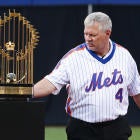Former New York Mets and Philadelphia Phillies outfielder Lenny Dykstra has had quite a few run-ins with the law over the years. Dykstra recently found himself in the courtroom once again after filing a lawsuit against former teammate and current Mets broadcaster Ron Darling.
Darling alleged that Dykstra yelled racial slurs at Boston Red Sox pitcher Dennis Boyd prior to Boyd taking the mound during the 1986 World Series. Dykstra denied that the incident ever took place and ended up filing a lawsuit against Darling for defamation and emotional distress.
The lawsuit has been dismissed and the reason is fairly intriguing. The judge actually agreed with Darling's claim that Dykstra had such a terrible reputation, that it would be impossible to libel him.
Here's what the judge had to say of Dykstra:
Based on the papers submitted on this motion, prior to the publication of the book, Dykstra was infamous for being, among other things, racist, misogynist, and anti-gay, as well as a sexual predator, a drug-abuser, a thief, and an embezzler. Further, Dykstra had a reputation—largely due to his autobiography—of being willing to do anything to benefit himself and his team, including using steroids and blackmailing umpires . . . Considering this information, which was presumably known to the average reader of the book, this Court finds that, as a matter of law, the reference in the book has not exposed Dykstra to any further "public contempt, ridicule, aversion or disgrace," or "evil opinion of him in the minds of right-thinking persons," or "deprivation of friendly intercourse in society."
The judge also detailed some of Dykstra's wrongdoings in the past, which include grand theft, embezzlement, and assault with a deadly weapon.
The nature and seriousness of Dykstra's criminal offenses, which include fraud, embezzlement, grand theft, and lewd conduct and assault with a deadly weapon, and notably the degree of publicity they received, have already established his general bad reputation for fairness and decency far worse than the alleged racially charged bench-jockeying in the reference could . . .
. . . Given the aforesaid litany of stories concerning Dykstra's poor and mean-spirited behavior particularly toward various groups including racial minorities, women, and the LGBTQ community—this Court finds that, as a matter of law, the reference cannot "induce an evil opinion of [Dykstra] in the minds of right-thinking persons" or "deprive him of their friendly intercourse in society," as that "evil opinion" has long existed.
The court of public opinion often is quick to label people before the process goes through a court of law. However, in this case, even the judge wasn't buying that Dykstra's reputation was damaged by Darling's claim.






















